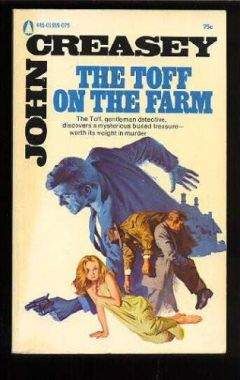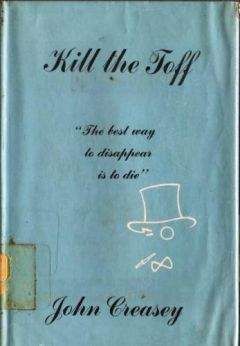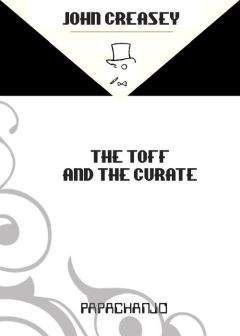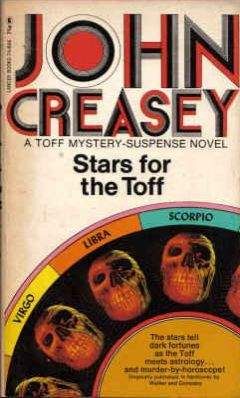John Creasey - The Toff and The Lady
She broke off and coloured furiously, for the door had opened and the Lady Lost stood there, so exquisitely gowned and so lovely, with the smile frozen on her lips and a hopeless expression in her eyes.
“Mr. Rollison,” she said, quietly, “please take me away from here.”
“My dear!” cried Hilda, “you are warmly welcome; my daughter is distraught or she would not have said such a thing.” She looked distractedly at Gwen. “Gwen, please, apologize for the hateful thing you said.”
Gwen looked steadily at the woman in the doorway, and spoke in a low-pitched voice, hardly moving her lips.
“Her memory is as good as yours and mine,” she said.
“Gwen!”
“Ask her to deny it,” sneered Gwendoline.
The woman in the doorway turned slowly and walked into the hall, carrying herself proudly and yet giving an impression that she had become deeply despondent and hurt. Hilda hurried after her. Gwendoline took a cigarette from a box on the table, lit it, and returned Rollison’s steady gaze.
“Do you really believe that?” he demanded.
“Yes, and so will you, unless you’re completely under her domination.”
Rollison said: “I see. And under whose influence did you refuse to tell me or the police about David, until to-night, and why are you still anxious not to let the police know that he has disappeared?”
She backed away, the colour now going from her face.
“Answer me,” said Rollison, roughly. “Who persuaded you to let him be away for two days?” When she did not answer, he went on with a hard note in his voice: “You’ve damned his reputation. Until he’s found, if he’s found, there will be a panic in the City, everything in which he has an interest will go to pieces. If you had wanted to ruin him you couldn’t have chosen a better way.” When she still remained silent, he added bitterly: “But perhaps you do want to ruin him.”
“Rolly!”
“You’re behaving as if you do,” said Rollison.
Hilda was still talking outside, and intermingled with her words was the voice of a man. It was Jolly. Jolly would not let Lady Lost go unaccompanied. Rollison stood looking at Gwendoline.
“Well, who was it?” he demanded.
In a low voice, she said: “Pomeroy.”
“The little fat man?”
“Yes.”
“The firm of Pomeroy, Ward & Pomeroy deny all knowledge of him,” said Rollison. “Who told you that the man’s name was Pomeroy, and what gave him the authority to make you keep silent about David for so long?”
She said: “David—brought him here. He seemed to trust him. He—Pomeroy—telephoned us yesterday. David should have kept an appointment with him yesterday evening, but did not. Pomeroy advised us to say nothing; he felt sure that David would come back before long.”
“You trust Pomeroy and yet distrust the woman?” Then, when he saw the hurt in her eyes, Rollison relented and rested a hand on her shoulder. “Don’t worry too much, Gwen. We’ll find him—but we must know everything, and the police must be told at once.”
“That’s—impossible.”
“You’ve a wrong idea of the police, too,” said Rollison. “Is there anything else?”
“The rumours,” said Gwen.
“They didn’t start by accident,” said Rollison.
He left her and hurried to the hall. Jolly was standing by a table on which was a pile of gramophone records in cardboard containers, as well as a coffee-pot, looking incongruous against the panelled background of the hall. Dressed again in her furs, Lady Lost was standing by Hilda’s side, and Hilda was saying:
“Of course I understand. I am so very sorry. Please do forgive my daughter.”
“Jolly,” said Rollison, going to his side, “have you a taxi waiting?”
“Yes, sir.”
“Then take the records, the coffee and Lady Lost back to the flat,” said Rollison. “I’ll get there as soon as I can.”
“Very good, sir,” said Jolly.
The Lady of Lost Memory looked at Rollison and smiled, a shadow of the smile he had seen at the flat. The footman was standing impassively by the door. Jolly picked up the records, which were heavy for him to carry in one load.
“Help him, please.”
“Very good, sir,” said the footman, and Jolly, relieved of half the records, took the coffee-pot from the table and walked sedately to the porch.
Rollison watched them get into the taxi, and looked up and down, still afraid of some unknown thing to which he could not put a name. Slowly and reluctantly he turned back to the house. The footman walked a pace behind him
Both exclaimed aloud!
From the shadows of the garden a man appeared, a short, thin man who was clearly visible against the light from the hall as he ran up the steps and into the house, then darted out of sight. Hilda screamed. Rollison sprinted. He saw the man turn into the drawing-room, heard an exclamation from Gwendoline—and then he reached the room and saw the knife which was hurtling through the air towards the girl. She stood as if petrified. Rollison shouted:
“Move, Gwen!”
He flung himself forward, but he knew that he would be too late. The knife seemed to miss Gwendoline, but before he reached her he saw blood welling from a cut in her neck. The little man who had thrown the knife turned and made for the door, like a rat at bay. He thought that Rollison was concerned only for Gwen, and did not notice him swing round and put out his foot. The man ran into it and pitched headlong. He fell by the feet of Hilda, in the doorway. Then she rushed towards Gwendoline.
She impeded Rollison, who tried to dodge round her, but she went the same way. He saw the little man pick himself up and rush into the hall. The footman was standing like a man struck dumb. He made no effort to stop the attacker, and when Rollison reached the hall the front door slammed.
Rollison glared at the footman, who still stood petrified.
“What is your name?”
“Farrow, sir.”
“Telephone for a doctor at once, Farrow.”
“Er—yes, sir. A doctor, yes, sir. Who?”
“The family doctor, Dr. Renfrew,” said Rollison, and he turned and went back into the room. There Hilda was bending over Gwendoline, who was sitting, ashen-faced, in an upright chair. Blood was welling freely from the wound in her neck, but the cut was not deep enough to cause serious harm. He padded a handkerchief while Hilda dabbed ineffectually with a tiny piece of lace. He pressed the pad against the cut, which was two inches long, then lifted her, so that her neck pressed against his shoulder, keeping the pad in position.
“Will you lead the way?” he said to Hilda.
The walk seemed interminable, but at last they turned into a large, high-ceilinged bedroom, furnished with maple, with a furry, thick-piled carpet and a silk-draped bed. Hilda turned down the bedclothes, and Rollison, managing to keep the pad in position so as to stop the bleeding, laid the girl down.
“A doctor!” exclaimed Hilda. “We must have Andrew!”
“I’ve sent for him,” said Rollison. “Don’t worry, it’s not serious.”
“Not—serious,” echoed Hilda, and from her too-bright eyes Rollison thought that she would faint. “She might”
“I—am—all right,” Gwendoline said. The words were an effort. Rollison wished she had not spoken, for the muscles of her neck moved and another crimson stain appeared on the edge of the handkerchief.
“Don’t talk, Gwen,” he said. “Hilda, hold the pad in position.” He let Hilda take over, and then asked: “Where will we find cotton wool?”
Before she answered a maid appeared, carrying a first-aid box—the first practical thing done at the house that night. Rollison gave her an appreciative smile, opened the box and took out cotton wool, making it into a pad to replace the handkerchief. He applied the new dressing, while the maid went out to get some hot water. He stood by the bed, looking towards the door—and as he stared, a man appeared, a little fat man now dressed in a dinner jacket suit, but unmistakably the man whom “David called Pomeroy”.
CHAPTER ELEVEN
COFFEE AND RECORDS
THE man stared blankly at Rollison, as if he had never seen him before. Rollison could not move from the bedside. Hilda turned, and backed a pace.
“What has happened?” asked the little fat man.
He had a gentle deceptive voice, with no heartiness, and there was now nothing about him to give the impression that he was a sporting gent. He smiled soberly at Hilda and stood looking down at Gwendoline. He did not seem shocked at the sight of blood.
“What has happened?” he repeated. “Who are you, sir?”
Rollison said: “How is your nose?”
“Nose?” asked the fat man, startled.
“You appear to have a bad memory,” said Rollison.
It was an impossible situation, and he was infuriated by his helplessness, but he did not trust Hilda to maintain the right pressure, and he had to stay where he was. There was no glint in the fat man’s eyes, only bewilderment. Even Gwendoline would believe the two men had never met before.
Then came hurried footsteps, and a youngish man entered the room carrying a small attache case. He was tall and well-dressed, and anxiety written clearly upon his countenance. This was Dr. Renfrew, good-looking and surprisingly young, and “Andrew” to Hilda Barrington-Ley. Renfrew recovered himself quickly and advanced to the bed.
The maid came in with a bowl of hot water and towels.
Rollison said: “It’s a knife wound in the neck.”
“Knife!” exclaimed Renfrew. He bent over the patient. The maid stood by. A middle-aged woman who could be relied on to keep her head. The fat man stood near the door, watching the proceedings with a puzzled stare.
Rollison said to Hilda: “We’ll wait downstairs.”
He put a hand on the fat man’s arm and led the way out of the room. The other did not protest, and they went down side by side. Their footsteps were muffled by the thick carpet. Rollison led the way into the drawing-room, where a few spots of blood were congealing on the cream carpet, and closed the door.
Puzzled eyes, but eyes which Rollison was not likely to forget, contemplated him.
“You bewilder me, sir,” said the fat man. “Who are you?”
“My name is Rollison,” said Rollison, heavily. He went across the room, picked up the knife by the blade, and put it on the piano. “And we have met before.”
“Not to my recollection,” said the fat man.
“At the office of Pomeroy, Ward & Pomeroy,” said Rollison, wondering whether there was any way in which he could make the man admit the truth.
The reaction to his words was curious. The other widened his small eyes to their fullest, opened his lips to a round “O”, and raised his podgy hands with the fingers outstretched, rather as if he had suffered an electric shock. He stood looking at Rollison until Rollison’s annoyance faded and he laughed.
“That infamous den!” exclaimed the fat man, in a voice squeaky with indignation. “I am insulted!” I have not set foot in that place for years and I never shall again. I have parted company with all the people connected with the firm, and
“ He broke off, narrowed his eyes, closed his mouth and
let his arms fall. “Sir,” he said, with dignity, “I demand an explanation.”
“You may keep on demanding,” said Rollison.
“I trust you are now convinced that you are mistaken.”
“I am not convinced one little bit,” said Rollison. “Did you know that Marcus Shayle was under arrest?”
Into the little eyes there sprang a wary glint. It took the man several moments to recover enough to ask who Marcus Shayle was. Rollison gave up trying. He had to, in any case, for the woman detective arrived from Grice. He made sure she knew exactly what to say to Lady Lost, and sent her to Gresham Terrace. The “maid” was a meek-looking, mild-mannered but powerful woman, and Rollison had no doubt that in a struggle she would be able to give a good account of herself. She would watch the Lady of Lost Memory with eagle eye.
Rollison was on edge to return to the flat, but there were other things to do. He went out by the side door, unobserved, and telephoned Scotland Yard. Late though it was, Grice was still there. Rollison told him exactly what had happened, including the reluctance of the Barrington-Leys to inform the police, and he made a special point of mentioning the little fat man.
“Are you formally asking me to come over?” Grice asked.
“No,” said Rollison, “but I’ll persuade Hilda Barrington-Ley to send for you—be patient for an hour or so, will you? There’s nothing that can usefully be done yet.”
“Did you see this man with the knife clearly?”
Rollison gave a description as best he could, then rang off and walked back to the house. No one appeared to have missed him. Pomeroy was still in the drawing-room, and he tried to freeze Rollison with a glance. Then Hilda came into the room with the young doctor.
She now introduced Dr. Renfrew, whom she continued to call Andrew. Rollison liked the look of the man, who smiled faintly as Hilda talked about the shock the attack had given her and how fortunate it was that Rollison had acted so promptly. Renfrew interrupted her when she paused for breath, looking at Rollison as if for support.
“Mrs. Barrington-Ley is reluctant to go to the police, and I have told her that she must do so.”
“You’ll have to report it, won’t you?” said Rollison.
“Yes,” said Renfrew, promptly. “I don’t want to act against your wishes, Mrs. Barrington-Ley, but”
“Andrew, if we hadn’t told you how it happened you would never have known. If it were suicide, you wouldn’t talk such nonsense.”
“That would be a different matter,” said Renfrew.
Rollison said: “Hilda, my sweet, Gwendoline was within a few inches of losing her life.” He picked the knife up from the piano, and Hilda gasped. “Dr. Renfrew knows he must tell the police. If you persuade him not to, it will only make things awkward for him, because I am going to see the police very soon.”
“Rolly!”
“And,” continued Rollison, “I am going to tell them that David is missing.”
“You are not!” cried Pomeroy.
It was the first time he had taken part in the conversation, and he made Renfrew start. The doctor’s dark, sleek hair and rather aquiline face gave him quite a presence, but the way he looked then made him seem very young. He was nearly as tall as Rollison, and he dwarfed Pomeroy, who came strutting forward and put a hand on Hilda’s arm.
“Aren’t we?” murmered Rollison.
“If you consider it your duty to inform the police of this dastardly attack on Gwendoline, then I am in full agreement,” said Pomeroy, “but to acquaint them of the fact that David is missing will be to heap coals upon the fire of rumour now sweeping through the City. Such an action would be a betrayal of friendship, would perhaps do incalculable harm to a great and good man. I have no doubt that there are excellent reasons for David’s protracted absence, and I insist that no such report is made to the police.”
He eyed Rollison, not with anger but with indignation, and his grip on Hilda’s arm tightened. It was easy to see how simple it had been for him to influence the others earlier.




